"Did you hear? Joe is quitting."
"But he's key to the new project launching next month!"
"Yeah, he said he was feeling burnt out and a friend's company was hiring."
"How are we going to replace them..."
If you're not looking out for them, the signs of a bad manager can be hiding in plain sight. And before you know it, you're having conversations like the one above, losing your best people.
There's nothing more demotivating and destroying than a bad manager. We've all had one. It sucks.
— Steve Schlafman 🐛✨🦋 (@schlaf) September 1, 2020
It's a leader's responsibility to find the bad managers in their organization, train them up or ship them out.
The fact is, people leave managers not companies.
So when you have a bad manager, it's likely you're going to lose good people in your company that report to them.
This can get expensive fast; our math shows it costs over $65,500 to replace even one person, but unfortunately, employees tend to leave in waves.
Turnover is one of many problems you'll face with bad managers.
Just because you don't have a wave of employees leaving a manager doesn't mean they're automatically doing a good job. There are also hidden costs, like disengagement that often come before turnover issues.
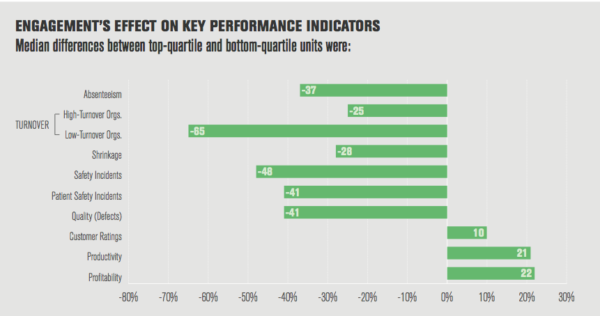
According to Gallup's State of the American Manager study, "The manager accounts for at least 70% of the variance in employee engagement."
This means that if employees are disengaged, there's a pretty good chance it's because of reporting to a bad leader.
Looking at the table above, you can see all the benefits you and the struggling manager are leaving on the table by not having an engaged team.
...and it's worse for senior leaders.
As if we haven't given you enough tough news already, most important is to recognize that a bad leader who has managers reporting to them, is going to impact even more people negatively in your company:
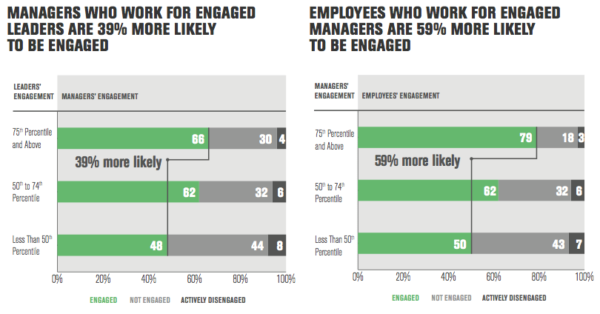
Gallup calls this the Cascade Effect; a bad senior leader will cause the managers reporting to them to be more likely to be disengaged...which then is passed to their teams. Pretty soon, you have an entire infected organization.
This is why it's so important for you to pay close attention to signs of a bad manager. You need to improve or replace them before it becomes very costly in money, time, effort, productivity, and health of your teams.
Today, we show you the signs to look for, so this doesn't happen to you.

Signs of a Bad Manager Senior Leaders should look for to avoid big problems
These signs start from the most obvious and move to the most subtle. As you gain experience as a leader, you'll find it easier to catch small signs of a bad manager, which means that fixing the problems will be much easier.
Instead of having to fire bad managers, or replace large portions of teams, you'll move towards coaching your leaders to be more effective, or gracefully transitioning someone back to IC who isn't a good fit as a manager.
Let's dive in.
Table of Contents:
- Sign #1: Look at your turnover and internal transfer numbers
- Sign #2: Look for poor 360 or 180/upward feedback survey results
- Sign #3: Uncover problems earlier with Skip Level 1 on 1s
- Sign #4: Make sure you have hired and promoted managers for the right reasons
- Sign #5: Watch for subtle warning signs from them and their team during regular work

Sign #1: Look at your turnover and internal transfer numbers
If people are all leaving a manager, there is no stronger sign of a bad leader. Bad managers typically have tons of excuses, so expect them to rationalize.
A good leader retains their team for the long haul. They create the kind of loyalty that makes people want to work with them for years, following them from company to company. If you hire a manager and they immediately have people applying to specifically work with them, you likely found a great leader.
On the other hand, employees leave bad managers. There's only so much anyone can tolerate before no amount of compensation, perks, or convenience makes it worth sticking around.
If you're seeing that a manager has most of their team only sticking around 9-18 months, it's a pretty strong sign that they're driving people away. Whether it's an internal transfer to another team or outright quitting your company, the signal is the same: people can't stand being around this manager.
Yet, even if you notice a lot of internal transfer requests from a certain manager or a wave of turnover, you still have to investigate why it's happening.

Exit interviews don't work. It's too late.
Unfortunately, stay interviews and exit interviews aren't necessarily going to be very revealing at this point for a variety of reasons:
- Many people don't like speaking negatively about others, especially if it will get the person in trouble.
- If you're leaving a company, it's better to leave "on good terms," which means being diplomatic about why you left.
- Having someone from HR involved can make people clam up as it can then feel like a legal proceeding.
- If you're transferring, you don't want to say anything negative because you'll still likely see or interact with them and risk retaliation.
- Others may feel it's not worth saying anything, because if you didn't care or ask while they were on the team, why would you care now?
With all this in mind, while it's good to want to understand what went wrong by the time you have a wave of turnover for a bad boss, you're not likely to learn as much as you hoped.
That's why it's important to look for signs of a bad manager earlier, which is what the next 4 signs are all about.
Further Reading:
- Learn how bad managers cause low morale on their teams.
- See our copious data on why people leave managers not companies here, and our sequel post here.

Sign #2: Look for poor 360 or 180/upward feedback survey results
Want to know what people really think? Ask them!
This is exactly why so many companies run 360 reviews to try to see how people are doing and work on any issues.
It's also why Google created their Upward Feedback (180) survey.
The Upward Feedback Survey
Awhile ago I read Work Rules, a book by Laszlo Bock, former VP of People at Google. It has lots of fascinating insights on taking a data driven approach to various challenges in building and scaling an organization while making HR a value-add department.
One of the most fascinating developments was their study of managers.
First, they literally A/B tested whether teams need managers, and after finding out no managers was an unmitigated disaster, they wanted to find out what made a great manager.
It turns out, a few key habits made all the difference whether someone was an effective manager at Google. To make sure their managers then took those actions, they created the Upward Feedback Survey:
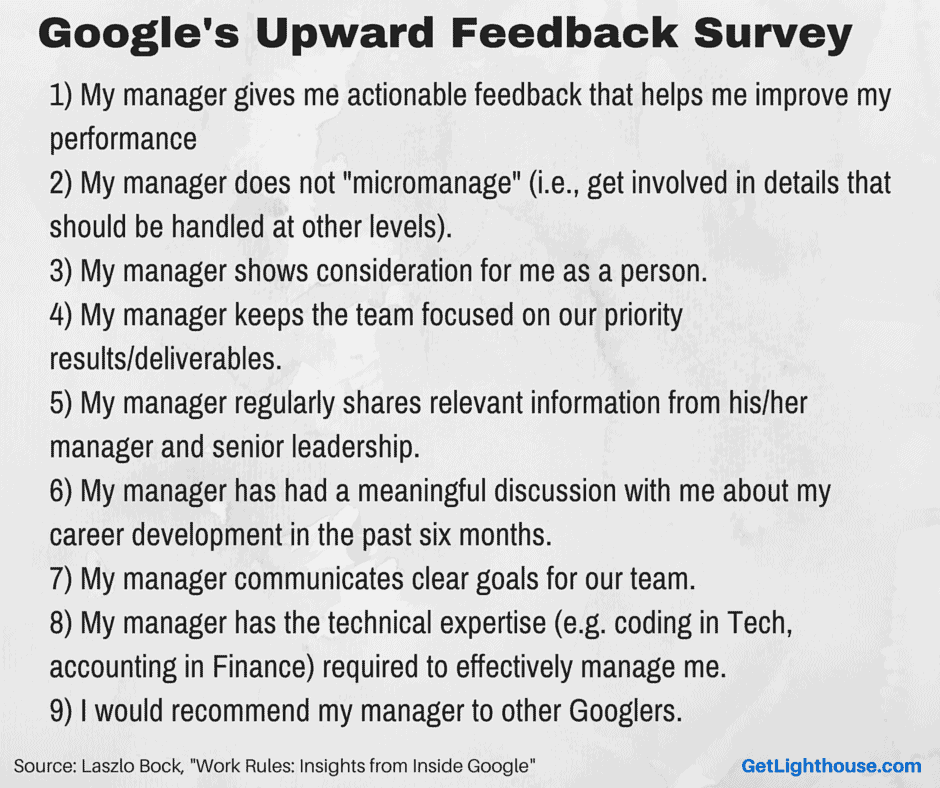
These survey results can then hint at any issues like say a manager who micromanages and doesn't talk about their employees' careers. If you score low on any of these questions, it's now really obvious what you need to start or stop doing.
Surveys are only as good as the actions that come from them.
Surveys like this are only as useful as the actions that you and the bad managers take to fix problems.
Think about it from an employee's perspective:
- Your manager is frustrating you in some way. Every day is getting a little less enjoyable.
- Finally! You are sent a survey about them so you can share what you're experiencing.
- You fill out the survey, even writing out some detailed examples to help whomever reviews it.
- Then you wait...and wait...and wait...
- Months go by and the survey is never mentioned, and nothing changes.
If you're presented another survey 6-12 months later, are you going to bother filling it out again? How much longer are you going to stick around in that job?

If you run a survey on your managers and nothing changes, you don't coach the manager, and the behaviors continue to disrupt their team, the second time you run one of these you'll see a plummet in participation and a lack of detailed feedback.
Make sure when you run these surveys you make it very clear that you're listening. This can be done by:
- Publicly talking about reviewing them.
- Responding privately to anyone writing very detailed answers about issues. They want to feel heard.
- Making time to go over the issues with the bad manager and following up to ensure they change.
- Ask the manager to talk about the results with their team. It will be uncomfortable, but it's a necessary step if they're going to change.
A survey is like a signal flare, drawing attention to a problem, but like a flare, it eventually burns out. Use it as a spark for change by asking the right questions and acting on any signs of a bad manager that come up.
Further Reading:
- Learn about Google's 6 key questions that help them tell if someone is a good manager here.
- Learn how to use 1 on 1s to make sure your performance reviews are effective here.
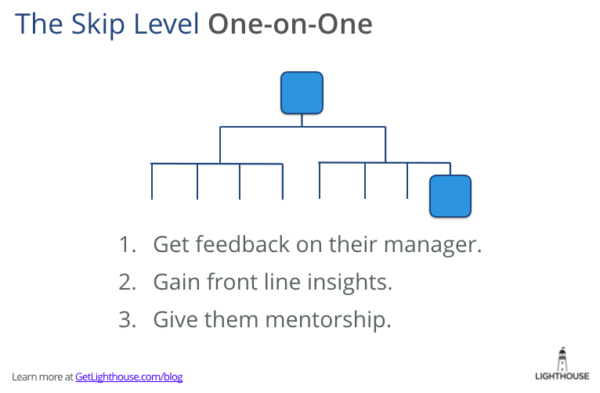
Sign #3: Uncover problems earlier with Skip Level 1 on 1s
Skip Level 1 on 1s are a powerful tool for any good senior leader. They help you in a variety of ways:
- Get a pulse on what's happening on the front lines you're layers removed from.
- Build trust with those lower in your organization so they stay engaged and contributing.
- Learn where there is dysfunction, insufficient communication, or confusion within parts of your organization.
- Personally demonstrate you value everyone in your organization in a scalable way.
- Find out how your managers are really doing beyond what they tell you.
- Get feedback and insights to help your managers, and their teams, improve.
Those last two are the ones that are why these are key for detecting signs of a bad manager in your organization.
By asking good questions in these meetings and truly listening, you'll uncover issues while they're easy to fix.
And if you meet with all or a large portion of a manager's team, you can then get multiple perspectives over a few weeks, so you can separate one cranky employee from widespread problems.
What should I ask?
There are many questions you should ask in skip level meetings, but specifically look for signs of a bad manager in your org, try some of these:
- Do you feel you're getting enough feedback from your manager? Why/Why not?
- When was the last time you had a conversation with your manager about your career? How did it go?
- Do you feel your manager is approachable? Why/why not?
- How does your manager handle questions when you ask for help?
- What is a recent situation you feel like your manager did a great job?
- What is a recent situation you wish your manager handled differently?
- What's the best part of working with [Manager Name]?
- What's the hardest part of working with [Manager Name]?
You can keep track of all of these questions by documenting them in our free 1:1 meeting template that you can download below.

Remember that before you ask any questions like this, make sure they're comfortable; you're their boss's boss after all. That can be intimidating.
Build some rapport and psychological safety, and then you're much more likely to get them to open up to you.

Action matters again.
Just like the survey responses, if you hear something from a manager's team, but then do nothing, you'll lose their faith. Any subsequent skip level 1 on 1 will be less insightful and much colder if they think there's no point in sharing ideas and issues with you.
To ensure you take action, make a note of anything that came up in a skip level 1 on 1 that you want to talk to the manager about. The manager's 1 on 1 is the perfect time to say "I heard some things from your team I want to work with you on..."
Regardless of where you keep the notes, closing the loop with their manager, while protecting the privacy of the team members you spoke with, will help you catch signs of a bad manager while they're fixable. Coach the manager on areas to improve, keep listening to their team in skip levels, and you may be surprised how quickly things can improve.
Further Reading:
- New to Skip Level 1 on 1s? Check out our complete primer on how to start, run, and make the most of skip level meetings.
- Looking for good questions to ask? Here are 66 questions for skip level meetings.
- Unsure how to navigate giving feedback you heard in skip level meetings? This post walks you through how to use skip level 1 on 1s to improve your managers.

Sign #4: Make sure you have hired and promoted managers for the right reasons
As Ben Franklin wrote, "An ounce of prevention is worth a pound of cure."
It's really expensive and challenging to change managers on a team after you've had a bad one. A new manager has all the old baggage to deal with and pressure to fix problems fast.
That's why it's important to find out why people want to become a manager or like being one. Good reasons would be things like:
- Empower people
- Helping bring out the best in others
- Rallying a group to achieve a goal
- Enjoying fixing people problems
Meanwhile, if you hear things like this, you're much more likely to have a bad manager in a few months:
- Doing it for the pay raise
- They like making decisions or being in charge
- They want to finally do things "their way"
If you promoted or hired leaders who are managers for the wrong reasons, then don't be surprised if many of the signs of a bad manager start manifesting:
- Doing it for the money: They'll likely treat their employees as coin operated, too, missing out on the power of intrinsic motivation.
- Like being in charge: This is ripe for a miserable dictatorship, where employees feel unheard and ignored.
- Do things "their way": Can you say stifling, micro-manager?
The signs of a bad manager are there even before they take the job if you connect the dots.

Make the right decision from the start, or course correct once you recognize it.
When you're trying to decide who to promote, make sure you're choosing them for the right reasons; look at the skills they have and think about how they translate to management.
Remember: What makes someone a good individual contributor does not mean they're good leadership material.
You need to be good at your job before you're a manager, but emotional intelligence, getting buy in, listening, and other people skills are more important as a manager.
You can avoid many headaches and problems by catching people wanting to be a manager for the wrong reasons before you give them a team.
But what do you do if they've already been promoted?!?
It's never too late to learn people's motivations. In fact, it's one of the best ways to align what you need done to what they're willing to do.
With that in mind, ask your managers why they wanted the job, and what they like most about the job. This is a great way to help you understand them better and identify red and yellow flags.
If you do hear a concerning answer like the ones we mentioned earlier, take it head on. Talk to them about how that could create problems for their team. Find out if they're willing to change, or if management maybe isn't really for them.
It's much better to get a new manager that is there for the right reasons, and give the old manager a different role they can thrive in, than it is to keep forcing a square peg in a round hole.
Further Reading:
- Learn the qualities to look for in a manager and the ones that bad managers tend to have.
- Avoid these common mistakes companies make promoting from within so you choose the right people and set them up for success.
- Learn why Silicon Valley has so many bad managers, and what you can do to break the vicious cycle if you're at a tech company.

Sign #5: Watch for subtle warning signs from them and their team during regular work
The higher you rise in an org, the more you will find it hard to stay connected to what's really going on. There's a few reasons for that:
- You're in higher level meetings removed from front line, individual contributor work.
- Your position and title can intimidate people, preventing them from coming to you.
- People want to be "in your good graces" so don't want to bring bad news, or even want to exaggerate good news to get your approval.
All of this means you need to hone your instincts to detect issues, because there are no neon signs pointing out the problems to you.
The subtle signs of a bad manager
While there are a variety of types of problems you'll have to be on the lookout for, today we're focused on bad managers.
These signs can come in two forms: signs from the manager, and signs from their team.
With the former, you're looking at the manager's direct actions and words, while the latter is about how the team is reacting and acting around their manager.
It's a bad sign if the manager does any of these things:
- Always talks about what they did, and not crediting their team.
- If there's a problem, they focus on excuses and blaming others.
- They hide problems from you instead of asking for your support and ideas on solutions they're working through.
- They complain about their team to you often.
And with their team, look out for these signs:
- If you ask them about their manager, there are long pauses, or they look down at first. It's usually a sign they're holding back.
- Their team is noticeably less responsive to their posts in Slack than other teams. Do they even acknowledge their manager?
- The team's body language seems more cold or eye-rolling than embracing and supporting their manager in public.
While it's very beneficial to learn to read body language, much of it is a lot more obvious than we want to admit.

The craziest body language lesson I ever saw.
I had a manager once who was generally disliked by the team, and it showed in a now funny, but at the time really uncomfortable way.
We were sitting down to have a team meeting in a room like the one pictured above. Despite the table sitting 8 people and there being 8 of us, everyone literally moved their seats to be as far away from the manager as possible.
I didn't even notice the awkward seat shuffling at first, until mid meeting I looked up and it was like our manager had a 10 foot force field around them that we were all repelled by. It looked something like this:
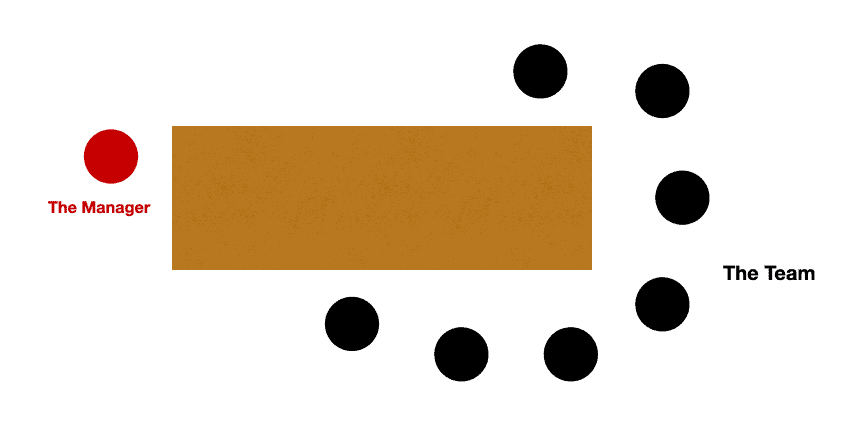
Not long after multiple people quit, and the team failed to hit key goals we had to.
We are social creatures and micro facial expressions and body language show you a truth no one may feel comfortable saying out loud.
If you know to look for them, you can get the essential insights to know something is wrong and fix it before it's too late. Otherwise, you have to wait until the signs are large and costly, like losing great employees or you have to fire the manager.
When you see an interaction with a manager and their team, take a minute to pause and ask yourself if it seems warm and positive, or distant and unhappy. That alone will not tell you what's happening, but it will help you catch and fix problems much sooner.
Trust your instincts and start asking questions and investigating when you see these signs.
Further Reading:
- If you want to learn about body language to help you better read these situations, I highly recommend What Every Body is Saying, written by a trained FBI agent.
- The sister to body language is emotional intelligence, everything you need to know about EQ in leadership.

Look for the signs of a bad manager before it really costs you.
The sooner you can be on the lookout for these issues, the better.
You won't always have the time, or insights to see it, which is why taking advantage of opportunities when you have them is so important.
And above all of this, remember your investment in developing the leaders reporting to you is the best prevention.
Even if your managers aren't all doing the job for the right reasons, or have bad habits, by setting expectations of what a good manager should do and taking time to teach it, you're much more likely to get good results from your managers.
With that in mind, here are some posts specifically for you to develop your managers more effectively:
- Even good people can become bad bosses, here's why
- And you could be contributing directly to the problem of poor management in these ways
- As a senior leader, it's very important you help set your managers up for success, here's a few ways how you can help:
And if you're thinking about how to teach your managers to lead remotely for the long haul, sign up for our latest Lighthouse Lessons program starting soon here. We'll guide you through a discussion with them about it, and give them bite-size, actionable lessons to follow each week.
Do you have a culture of great leadership?
Do your managers have the skills and habits you want them to? Lighthouse Lessons helps your leaders learn essential skills, and reinforce your in person training programs with our bite-size email based programs.
Build a culture of coaching and great leadership like Textron has by learning more and signing up here.





